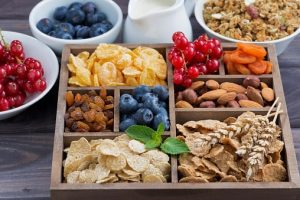
Many risk factors are already known to increase the chance of developing CKD. These include aging, high blood pressure, high cholesterol, smoking, and an unhealthy diet. There are also several preventative factors that have been already proven. These include consuming a diet high in plant protein, vitamin C, magnesium, potassium, and fatty acids and low in animal protein and sodium. Specific dietary guidelines have yet to be determined for preventing CKD, however.
In a new study, researchers examined the relationship of dietary fibre intake from fruits, vegetables, legumes, and grains with kidney function, and the resulting risk of chronic kidney disease. The experiment was a population-based prospective study, which followed 1,630 people over the course of six years. At the outset of the experiment none of the participants had kidney disease.
Vegetable and Legume Fibre Preferred over Fruit or Cereal Fibre
The results of the study showed that the participants who followed a diet high in fibre presented with higher kidney function and lower risk of developing chronic kidney disease. The individuals who consumed more than 26g of fibre per day had a 50 percent decrease in the risk of chronic kidney disease compared to those who consumed less than 17.7g of fibre per day. The results also showed an 11 percent lower risk of chronic kidney disease in the participants who increased their total fibre intake by 5g per day from the baseline at the beginning of the study.
These results were only seen as a product of the consumption of fibre from vegetables and legumes. Fruit or cereal fibre did not product the same decreased risk of developing CKD.
The researchers behind the study surmised that the reasoning behind this peculiarity of source of fibre was due to the decrease on the glycaemic index seen after the consumption of fibre from legumes. In laymen’s terms, consuming vegetables or legumes decreases the amount of sugar in your blood, whereas consuming fruits or cereals increases the amount of sugar in your blood. Consumption of vegetables and legumes is also known to be related to decrease in risk of diabetes, high blood pressure, and high blood lipids, all of which are risk factors for the development of CKD. In addition, vegetables and legumes are known to be good sources of antioxidants and any number of crucial vitamins and minerals needed for proper organ functions. The researchers believe all of these reasons may explain the difference to the risk of developing CKD between a diet high in fibres from vegetables and legumes as opposed to a diet high in fibres from fruit or cereal.
Related:
Chronic kidney disease patients consuming high acid diet are more likely to develop kidney failure
Chronic kidney disease diet: Food list, recommendations, and recipes